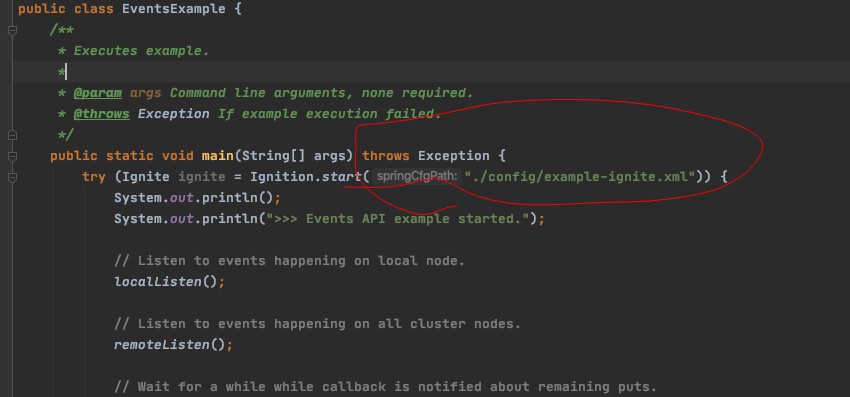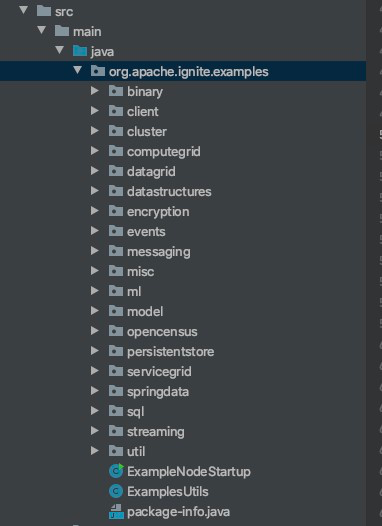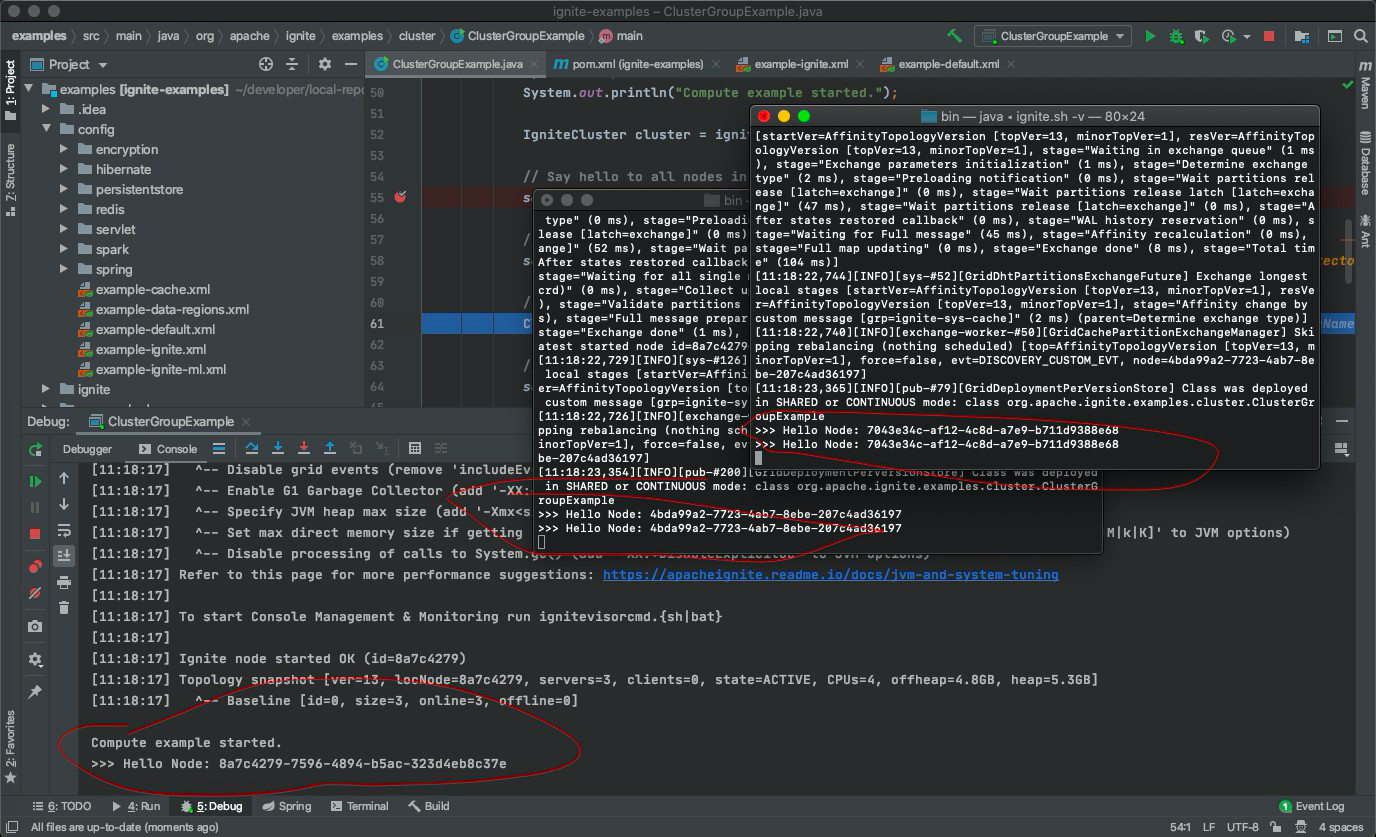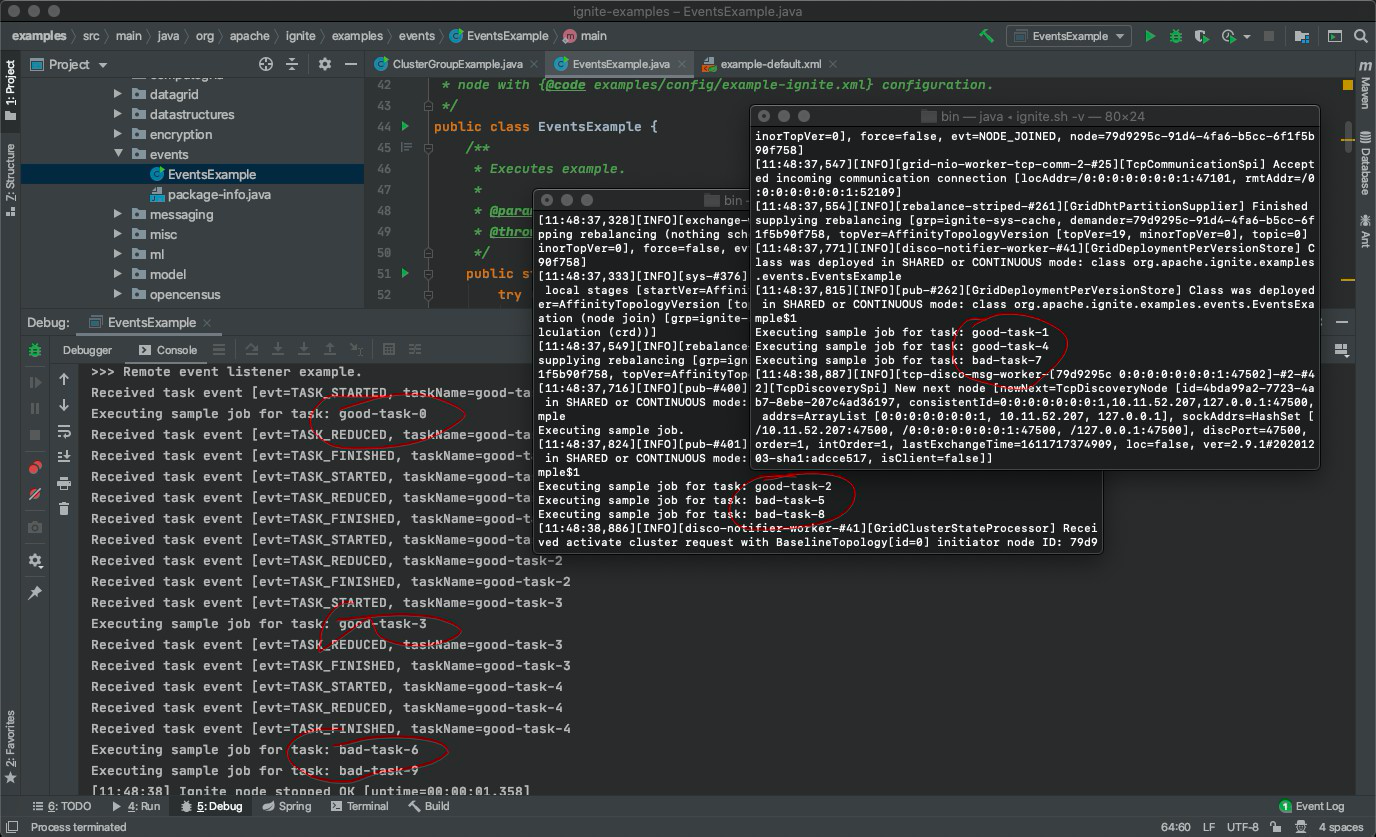ignite-example
这是一篇引导初学者如何使用ignite技术的实战指导,可能好多高级没有走过也可以用来参考,继续深入学习ignite技术运用。
掌握这个样例,可以说ignite入门了!
后续的进阶要在实战中积累,如springdata结合使用、集群维护等。
准备
下载apache-ignite-2.9.1-bin.zip
下载ignite2.9.1版本的zip,本地解压即可,然后将default-config.xml文件修改为如下配置(同example配置一致)。
<?xml version="1.0" encoding="UTF-8"?>
<beans xmlns="http://www.springframework.org/schema/beans"
xmlns:xsi="http://www.w3.org/2001/XMLSchema-instance"
xmlns:util="http://www.springframework.org/schema/util"
xsi:schemaLocation="
http://www.springframework.org/schema/beans
http://www.springframework.org/schema/beans/spring-beans.xsd
http://www.springframework.org/schema/util
http://www.springframework.org/schema/util/spring-util.xsd">
<bean id="grid.cfg" class="org.apache.ignite.configuration.IgniteConfiguration">
<property name="peerClassLoadingEnabled" value="true"/>
<property name="includeEventTypes">
<list>
<util:constant static-field="org.apache.ignite.events.EventType.EVT_TASK_STARTED"/>
<util:constant static-field="org.apache.ignite.events.EventType.EVT_TASK_FINISHED"/>
<util:constant static-field="org.apache.ignite.events.EventType.EVT_TASK_FAILED"/>
<util:constant static-field="org.apache.ignite.events.EventType.EVT_TASK_TIMEDOUT"/>
<util:constant static-field="org.apache.ignite.events.EventType.EVT_TASK_SESSION_ATTR_SET"/>
<util:constant static-field="org.apache.ignite.events.EventType.EVT_TASK_REDUCED"/>
<util:constant static-field="org.apache.ignite.events.EventType.EVT_CACHE_OBJECT_PUT"/>
<util:constant static-field="org.apache.ignite.events.EventType.EVT_CACHE_OBJECT_READ"/>
<util:constant static-field="org.apache.ignite.events.EventType.EVT_CACHE_OBJECT_REMOVED"/>
</list>
</property>
<property name="discoverySpi">
<bean class="org.apache.ignite.spi.discovery.tcp.TcpDiscoverySpi">
<property name="ipFinder">
<bean class="org.apache.ignite.spi.discovery.tcp.ipfinder.multicast.TcpDiscoveryMulticastIpFinder">
<property name="addresses">
<list>
<value>127.0.0.1:47500..47509</value>
</list>
</property>
</bean>
</property>
</bean>
</property>
</bean>
</beans>
最后直接启动 $ ./ignite.sh -v 即可,端口会自动分配,不用修改其他。
下载ignite-example用例
1、在apache-ignite-2.9.1-bin.zip包解压后的examples目录里面就是,可以直接复制出了用。点击下载
2、下载apache-ignite-2.9.1-src.zip解压后的example目录就是,这个是代test样例代码的。点击下载
3、下载我的样例ignite-example。点击下载
代码下载后使用idea的maven把jar下载后complie即可运行,这里需要注意配置文件的访问路径需要修改,不然起不来(因为examples的上下文在copy建立新工程时改变了,我的测试中是没有examples目录的)。

样例工程介绍
样例覆盖范围涵盖了ignite所能支持的所有场景,下面ClusterGroup和Events样例运行需要启动两个ignite节点进行配合。

ClusterGroupExample
public static void main(String[] args) throws IgniteException {
try (Ignite ignite = Ignition.start("./config/example-ignite.xml")) {
if (!ExamplesUtils.checkMinTopologySize(ignite.cluster(), 2))
return;
System.out.println();
System.out.println("Compute example started.");
IgniteCluster cluster = ignite.cluster();
// Say hello to all nodes in the cluster, including local node.
sayHello(ignite, cluster);
// Say hello to all remote nodes.
sayHello(ignite, cluster.forRemotes());
// Pick random node out of remote nodes.
ClusterGroup randomNode = cluster.forRemotes().forRandom();
// Say hello to a random node.
sayHello(ignite, randomNode);
// Say hello to all nodes residing on the same host with random node.
sayHello(ignite, cluster.forHost(randomNode.node()));
// Say hello to all nodes that have current CPU load less than 50%.
sayHello(ignite, cluster.forPredicate(n -> n.metrics().getCurrentCpuLoad() < 0.5));
}
}
/**
* Print 'Hello' message on remote nodes.
*
* @param ignite Ignite.
* @param grp Cluster group.
* @throws IgniteException If failed.
*/
private static void sayHello(Ignite ignite, final ClusterGroup grp) throws IgniteException {
// Print out hello message on all cluster nodes.
ignite.compute(grp).broadcast(
() -> System.out.println(">>> Hello Node: " + grp.ignite().cluster().localNode().id()));
}
EventsExample
public static void main(String[] args) throws Exception {
try (Ignite ignite = Ignition.start("./config/example-ignite.xml")) {
System.out.println();
System.out.println(">>> Events API example started.");
// Listen to events happening on local node.
localListen();
// Listen to events happening on all cluster nodes.
remoteListen();
// Wait for a while while callback is notified about remaining puts.
Thread.sleep(1000);
}
}
/**
* Listen to events that happen only on local node.
*
* @throws IgniteException If failed.
*/
private static void localListen() throws IgniteException {
System.out.println();
System.out.println(">>> Local event listener example.");
Ignite ignite = Ignition.ignite();
IgnitePredicate<TaskEvent> lsnr = evt -> {
System.out.println("Received task event [evt=" + evt.name() + ", taskName=" + evt.taskName() + ']');
return true; // Return true to continue listening.
};
// Register event listener for all local task execution events.
ignite.events().localListen(lsnr, EVTS_TASK_EXECUTION);
// Generate task events.
ignite.compute().withName("example-event-task").run(() -> System.out.println("Executing sample job."));
// Unsubscribe local task event listener.
ignite.events().stopLocalListen(lsnr);
}
/**
* Listen to events coming from all cluster nodes.
*
* @throws IgniteException If failed.
*/
private static void remoteListen() throws IgniteException {
System.out.println();
System.out.println(">>> Remote event listener example.");
// This optional local callback is called for each event notification
// that passed remote predicate listener.
IgniteBiPredicate<UUID, TaskEvent> locLsnr = (nodeId, evt) -> {
// Remote filter only accepts tasks whose name being with "good-task" prefix.
assert evt.taskName().startsWith("good-task");
System.out.println("Received task event [evt=" + evt.name() + ", taskName=" + evt.taskName());
return true; // Return true to continue listening.
};
// Remote filter which only accepts tasks whose name begins with "good-task" prefix.
IgnitePredicate<TaskEvent> rmtLsnr = evt -> evt.taskName().startsWith("good-task");
Ignite ignite = Ignition.ignite();
// Register event listeners on all nodes to listen for task events.
ignite.events().remoteListen(locLsnr, rmtLsnr, EVTS_TASK_EXECUTION);
// Generate task events.
for (int i = 0; i < 10; i++) {
ignite.compute().withName(i < 5 ? "good-task-" + i : "bad-task-" + i).run(new IgniteRunnable() {
// Auto-inject task session.
@TaskSessionResource
private ComputeTaskSession ses;
@Override public void run() {
System.out.println("Executing sample job for task: " + ses.getTaskName());
}
});
}
}
样例运行
项目编译中遇到maven的jar下载不了可更换镜像仓库到阿里的私服。用例运行属于传统java的application体系,直接run main方法即可。


这些用例写的非常实用,结构简单清晰,真的apache的水准。他们推一个新技术思考的非常全面,就比如doc和example,清晰还全面让人一看就懂。这样最大的好处技术使用成本非常低,和国内很多公司推广开源技术相比,大巫见小巫啊。